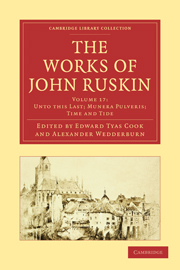Book contents
- Frontmatter
- Contents
- LIST OF ILLUSTRATIONS
- INTRODUCTION TO THIS VOLUME
- PART I “UNTO THIS LAST” (1860)
- PART II “MUNERA PULVERIS” (1862, 1863)
- PART III “TIME AND TIDE, BY WEARE AND TYNE” (1867)
- APPENDIX: LETTERS AND PAPERS ON ECONOMIC SUBJECTS 1863–1873
- I LETTERS ON “MUNERA PULVERIS” (1863, 1875, 1877)
- II THE DEPRECIATION OF GOLD (1863)
- III LETTERS ON THE LAW OF SUPPLY AND DEMAND (1864, 1873)
- IV LETTERS ON WORK AND WAGES TO THE “PALL MALL GAZETTE” (1865)
- V LETTERS ON SERVANTS AND HOUSES TO THE “DAILY TELEGRAPH” (1865)
- VI LETTERS ON RAILWAYS AND THE STATE (1865, 1868, 1870)
- VII SPEECHES ON TRADES UNIONS AND STRIKES (1868)
- VIII EMPLOYMENT FOR THE DESTITUTE POOR AND CRIMINAL CLASSES (1868)
- IX LETTERS ON ROMAN INUNDATIONS (1871)
- X LETTERS ON “HOW THE RICH SPEND THEIR MONEY”(1873)
- XI HOME, AND ITS ECONOMIES (“CONTEMPORARY REVIEW,” MAY 1873)
- Plate section
VII - SPEECHES ON TRADES UNIONS AND STRIKES (1868)
Published online by Cambridge University Press: 05 November 2011
- Frontmatter
- Contents
- LIST OF ILLUSTRATIONS
- INTRODUCTION TO THIS VOLUME
- PART I “UNTO THIS LAST” (1860)
- PART II “MUNERA PULVERIS” (1862, 1863)
- PART III “TIME AND TIDE, BY WEARE AND TYNE” (1867)
- APPENDIX: LETTERS AND PAPERS ON ECONOMIC SUBJECTS 1863–1873
- I LETTERS ON “MUNERA PULVERIS” (1863, 1875, 1877)
- II THE DEPRECIATION OF GOLD (1863)
- III LETTERS ON THE LAW OF SUPPLY AND DEMAND (1864, 1873)
- IV LETTERS ON WORK AND WAGES TO THE “PALL MALL GAZETTE” (1865)
- V LETTERS ON SERVANTS AND HOUSES TO THE “DAILY TELEGRAPH” (1865)
- VI LETTERS ON RAILWAYS AND THE STATE (1865, 1868, 1870)
- VII SPEECHES ON TRADES UNIONS AND STRIKES (1868)
- VIII EMPLOYMENT FOR THE DESTITUTE POOR AND CRIMINAL CLASSES (1868)
- IX LETTERS ON ROMAN INUNDATIONS (1871)
- X LETTERS ON “HOW THE RICH SPEND THEIR MONEY”(1873)
- XI HOME, AND ITS ECONOMIES (“CONTEMPORARY REVIEW,” MAY 1873)
- Plate section
Summary
MR. Ruskin was certain that political economy as it would one day be understood was a true science. He was not so sure that, as it had been hitherto explained, it was a true science. He had ventured to resist that theory of political economy which laid down that man was a predatory animal by nature, and to assert that he was by nature an affectionate animal, and that his economy ought to be based upon the affections. What, he asked, would be the relations of mistress and servant when the former looked upon the latter as a predatory animal? Could a household so constituted be conducted on proper principles? Before endeavouring to teach political economy as a science, it was necessary to consider whether it required any additions to complete it. No doubt, combination was a safeguard to workmen; but in connexion with it, there were two points to be aimed at—one was to meet the abuses which ignorance had introduced, and the other was to direct combination, most quickly and certainly, to the obtaining of the utmost possible good. There was one point in respect to which he felt political economy had especially failed. He heard it perpetually said that trades unions had interfered with the natural law of wages.
- Type
- Chapter
- Information
- The Works of John Ruskin , pp. 536 - 539Publisher: Cambridge University PressPrint publication year: 2010First published in: 1905

